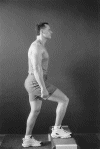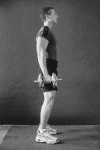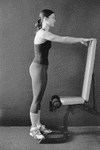5 Secrets Of A Better Butt
Toning RoutineFrom
eDiets - The online diet, fitness, and healthy living resource
Some like it hot while others start to sweat
the moment spring gives way to summer and they are faced with the heat of
swimsuit season! But with many of us choosing warm weather destinations for
vacations and get aways, swimsuit fit has to be a year round commitment.
If you spend the winter months cuddling up
to one too many comfort foods, you're probably cringing at the thought of
hitting the pool or beach. No butts about it: you need an effective butt toning
routine... and you need it NOW!
Chill out. You can have a better
butt with the help of fitness expert Michael Stefano. The author of The Firefighter’s Workout (HarperCollins) has
the hottest butt firming routine in town. Michael says the answer to your tush
troubles lies in the proper strength training workout. The biggest mistake
most people make is to solely turn to cardio, he tells
eDiets. While cardio might be a piece of the puzzle, it won't
sculpt, tone or firm. Youll have negligible toning effects but nothing
hardcore. You have to incorporate resistance training to tone the butt or any
other body parts.
But, it takes more than strength training,
cardio and proper diet to boast the best buns around. You also need Michael's 5
secrets to a better butt. You'll consider this bonus the golden rules for
toning ALL your trouble spots... from head to toe.
1. Apply perfect form with the right
resistance. From the proper stance to the proper posture, form is
everything. If you dont follow the instructions to the letter, you wont get the
results. Whatever method youre using, make sure you choose the right movements
and adhere to proper form.
2. Make sure you have the proper
intensity. While most men are too intense, most women arent intense enough.
When we talk about intensity, were talking about muscle fatigue. You have to
work to some level of muscle fatigue. You should feel a slight burn or
discomfort due to the release of lactic acid. If you cant make another move,
youve probably gone too far. Proper intensity is absolutely essential.
3. Control the number of sets and
reps. You want to be between the 12 to 20 range, but you still want to hit
muscle fatigue. If you need to increase the intensity of your workout, dont
increase the reps or sets. Instead, add weights or resistance. Staying in the
12- to 20-rep range will accomplish both toning and fat burning.
4. Get adequate rest and recovery.
You cant do these exercises every day or youll overtrain the muscles or set
yourself up for injury. Allow for 48 to 96 hours rest between each workout. In
other words do no more than two to three sessions a week. Another crucial
element: the proper amount of rest time between sets. When performing Michael's
circuit training workout, rest one to two minutes between sets. This makes it a
somewhat aerobic, fat-burning workout. Keeping rest to a minimum enhances the
fat-burning effect of the workout.
5. Combine big multi-muscle
movements with smaller, isolated movements. For example, combine the squats
with the kickback. The squat works the entire lower body while the kickback
concentrates on the glutes.
Bottoms up: here is Michael's ultimate
butt-toning workout. Perform 12 to 20 reps of the step up (each leg). Then move
directly to 12 to 20 reps of the squat. Complete the set with 12 to 20 reps of
the standing kickback (each leg). Rest one to two minutes and repeat the entire
set two more times with a one to two minute rest in between.
 STEP
UP STEP
UP
Place your right foot flat on the step and your left foot flat on
the floor. Exhale and push off as little as possible with the left foot as you
bring both feet up to step level. Inhale and lower your left foot to the floor.
Repeat to muscle fatigue (in the range of 12 to 20 reps). Repeat with the legs
reversed.
Intensity Booster/Reducer: Adjust step height, hold dumbbells
or perform all reps with one leg before making the switch.
 SQUAT SQUAT
Stand with your feet shoulder-width
apart, holding dumbbells at your sides. Keep the head held straight while you
maintain the natural arch in your back, knees are soft. Inhale as you bend at
the knees and hips to a sitting position, or as low as you can comfortably go
without pain or discomfort in the lower back or knees (squatting down half way
will still get remarkable results). Allow the arms to swing forward for
balance. Your buttocks never drop below the level of your knees, and your knees
do not extend beyond the toes. Exhale, slowly rising to a standing position,
with knees and hips straight, allowing the arms to drop back to your sides.
Ideally, select a resistance level (body weight or dumbbells) that enables you
to hit muscle fatigue in the 12- to 20-repetition range.
Intensity
Booster/Reducer: Hold dumbbells (as shown), perform at a slower pace (squat
down to a slow count of 8, and back up to a slow count of 4) to increase
resistance. Do half squats to reduce intensity.
 STANDING KICKBACK STANDING KICKBACK
Stand holding the back
of a chair or bench for balance. With your feet together, rotate your right
foot to the right with all the rotation coming from your hip joint. Exhale and
in a very slow and controlled motion with the right foot rotated out, without
bending your knee, lift the right leg (with all motion at the hip joint) behind
you. The actual movement will only be a slight lift. Inhale and slowly lower
leg to starting position. Repeat to muscle fatigue (in the range of 12 to 20
reps). Repeat with legs reversed.
Intensity Booster/Reducer: Ankle
weights can be used to add intensity, while reducing the height of the lift
will reduce it. |